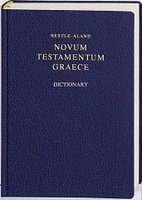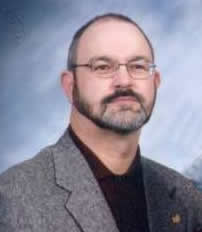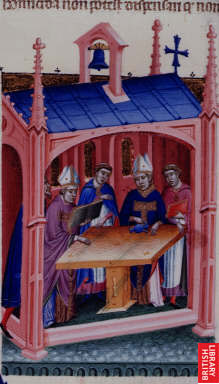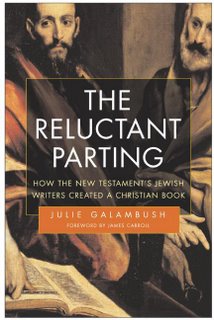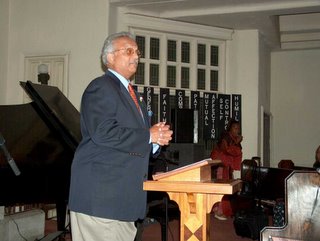 At this moment (7:42 p.m.), Dr. Dale Salico has been explaining and answering questions for almost three-quarters of an hour to several hundred PSW Baptists at the First Baptist Church of Alhambra (CA). He has been using a Powerpoint presentation to articulate the steps taken by PSW to attempt to work within the ABCUSA. At this point, most of the questioners have represented the disgruntled left. But, judging from a look at who is here (mainly from San Gabriel Valley churches), it looks as if the vast majority hail from the right.
At this moment (7:42 p.m.), Dr. Dale Salico has been explaining and answering questions for almost three-quarters of an hour to several hundred PSW Baptists at the First Baptist Church of Alhambra (CA). He has been using a Powerpoint presentation to articulate the steps taken by PSW to attempt to work within the ABCUSA. At this point, most of the questioners have represented the disgruntled left. But, judging from a look at who is here (mainly from San Gabriel Valley churches), it looks as if the vast majority hail from the right. As the evening continues to unfold (8:00 p.m.) more of the conservative pastors are standing up and making affirmative statements, supportive of Dr. Salico. Reference has also been made to a paper by Dr. Bob Meye (posted on His Barking Dog yesterday. Salico strongly affirms the work of Dr. Meye and has handed copies of it out to the entire assembly.
As Dr. Salico sees the issue, PSW will seek to establish distance between the PSW and the national body to reduce the "constant level of clashing that goes on between the two." "What will the PSW look like? PSW exists to be strengthening churches to change their worlds for Christ. That will not change," says Salico. Core values of Biblical authority, local church integrity, leader development, and kingdom multiplication will also not change, he notes.
Dr. Salico walked through the regional statement on human sexuality. It establishes standards for heterosexual fidelity, biblical morality, and a proscription of homosexual behavior. Quoting from the regional policy statement from 1995, Salico recalled how he was asked by the search committee that called him as Executive Minister if he would implement the policy. This involved advocating at all levels of the denomination for traditional "biblical" morality. Also he was asked to urge all covenanting partners to take action to implement the 1992 resolution on human sexuality. Finally, the committee tasked him with the responsibility of explaining how the following of the first two points was "essential" and necessary for the "continued unity of this denomination." In a sense, the actions being undertaken currently by the region board are merely an application of the charge given to Dr. Salico when he came here in 1997.
Will we be all alone? No. Relationships with other regions, the Board of International Ministries, and more will continue. BIM has agreed to enter into a new agreement with the PSW churches. MMBB, Willow Creek Association, Vision USA, ECFA, Vantage Point 3, American Baptist Theological Center, Northern Seminary, Multicultural Ministries, and the Hispanic Baptist Convention, PSWLA Black Caucus, and AB Indian Ministries are but a few of the partners that will continue in relationship with PSW.
After a stand up break, Salico returned to his clear and persuasive Q&A at 9:00 p.m. In response to a question, he recalled the history of actions within the ABCUSA on the subject of human sexuality. His account of the history of the 1992 resolution by the General Board was enlightening to many who did not know the history.
A moving question from a member of one of the San Gabriel Valley churches spoke of being the adult child of a family broken by the homosexual desires and behavior of his father. He asked what the region intended to do with regard to resourcing churches for practical incarnational ministry to GLBT persons. Salico spoke of a major conference to be presented within the year, featuring three national speakers (a pastor with extensive ministry to gays, a seminary prof from Eastern, and a leader of an exit type ministry for homosexuals).
As Salico explained it, the only item of business on April 29 will be: "Should the American Baptist Churches of the Pacific Southwest (ABCPSW) withdraw from the Covenant of Relationships and Agreements with the American Baptist Churches USA as rrecommended by the Board of Directors of the ABCPSW?" The ballot will allow only a yes or no answer. Questions of clarification may be asked. However, there will be no time devoted to debate or discussion. Salico has made a number of Town Hall meetings available for the expressions of opinions, asking of questions, and the like.
The purpose for the meeting is "for the Board to receive an expression of the will of the delegates to provide the Board with the guidance and input it needs to make a responsible and informed decision on withdrawing from the Covenant of Relationships of the American Baptist Churches, USA."
Salico was unflapable, ultra-calm, and methodical in his presentation. He carried himself with an authority not borne merely of natural abilities but by Spirit-filled unction.
[His Barking Dog is merely an observer to the events unfolding. I do not speak for anyone official or for any entity in the PSW]
